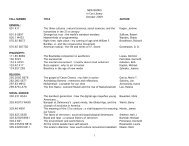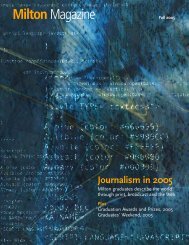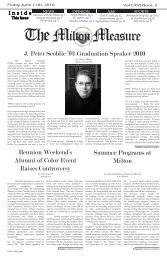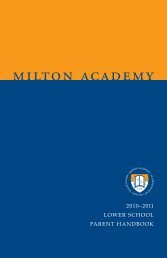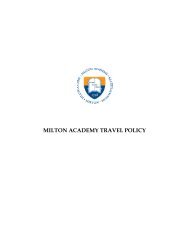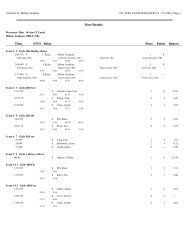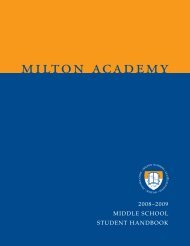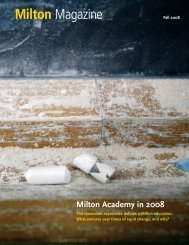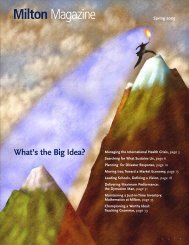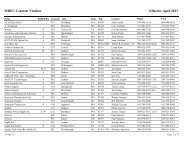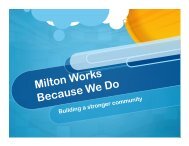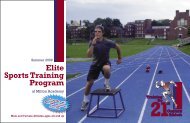Spring 2007 - Milton Academy
Spring 2007 - Milton Academy
Spring 2007 - Milton Academy
- No tags were found...
Create successful ePaper yourself
Turn your PDF publications into a flip-book with our unique Google optimized e-Paper software.
Who’s in charge? And why?On Wednesday mornings, the students are.Sixth graders are their own kettleof fish. They need support andattention and, at the same time,increasing independence. Theyneed space of their own, chancesto express plenty of physicalenergy, and constant intellectualstimulation.Within a program that meetsthese developmental needs andprepares sixth graders for theculture and academic challengesof the Upper School, Wednesdaycommunity meetings are a weeklyhighlight.Students look forward to it; perhapsthat’s because students runthe meeting. Wednesday communitymeetings are carefullystructured to provide opportunitiesfor leadership, connectionand expression.Two students lead the meetingeach week. For five to seven minutes,they present two thingsabout themselves that they’d liketo share. At one meeting, forexample, two boys presented anin-depth PowerPoint presentationabout how much they lovedHarry Potter books, why theywere worth loving, and how theywould rank each of the volumesrelative to the whole series. Theyopened the door, and all the stu-dents walked in: Why did youchoose ______ ? What do youthink about ______ ? What’s goingto happen in ______ ?Next up on the agenda was theProblem of the Week. The meetingleaders gave the answer tolast week’s problem and posedthe problem for the upcomingweek, a problem they had created,which is then posted on thecommunity board for all to solve.For “word of the week,” theyhad chosen trigonometry. Neverhaving lived a moment withoutWikipedia, that’s where theystarted with their definition, butnot where they ended.Next, the two students selectedslips of paper from the KindnessBox to read out loud. Studentsfill the box during the week, withcitations of small kindnessesthey have experienced from theirpeers. This is a favorite exercise,and the two boys could continuefor quite some time: “Nina gaveme some Laffy Taffy.” “Jasonfound my index cards.” “When Iwas really parched, John gave mesome water.” “Emma saved aseat for me.”Faculty members are allowedonto the program near the end ofthe meeting. Along with studentswho have announcementsto make about upcoming activities,athletic events, and projects,faculty members let studentsknow what to expect in the weekahead.Carrie Ellis, sixth-grade dean,says, “Developmental levels reallyinform the sixth-grade year.[The students] are on the cusp ofchildhood and adolescence.Working with younger students—wehave reading buddiesin the first and second grade andwe run field day for the LowerSchool—we have opportunitiesfor leadership, and we discusstheir roles, asking, ‘How do youwant to be known as sixthgraders?’ The community meetingis an opportunity for leadershipamong their peers.”When all the components of themeeting wrap up, students havepraised one another and reinforcedthe themes faculty areworking to stress in the life ofthe School. They have laughedout loud, shared interests, beenchallenged, applauded and startedthe day on an upbeat note.CDEEEH54 <strong>Milton</strong> Magazine



